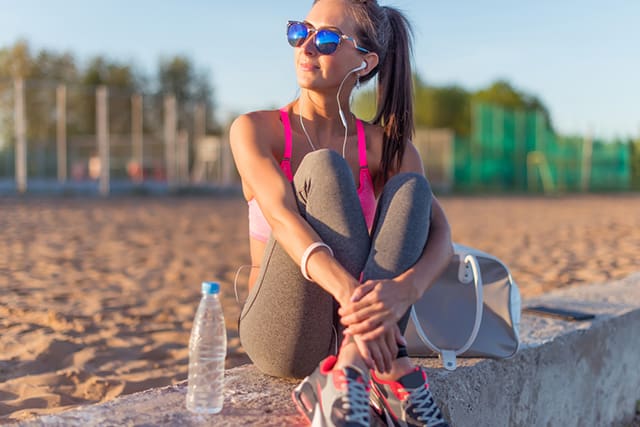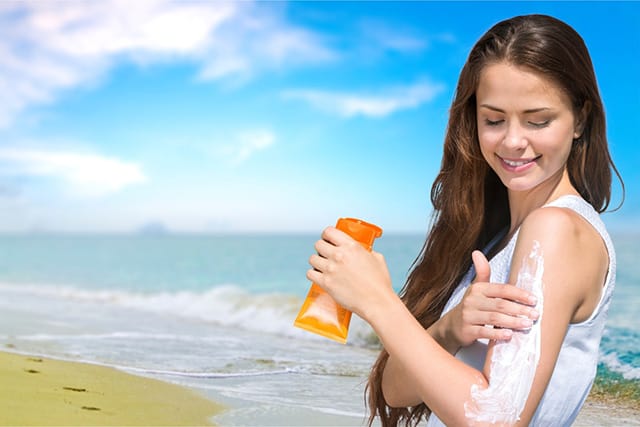Don’t you love going to the beach to hear the ocean and smell the clean outdoor air? We all love the sand between our toes, the cool water and the sun on our faces. Afterward, I am beaten. I always forget how worn out I feel when I get home from being out in the sun. I need a nap, big time. There are actually scientific reasons that explain the tired after the sun phenomena that most of us experience.
#1. Body Temperature
Scientists say that energy from the sun transfers heat to the body through electromagnetic radiation in the form of photons. This radiation causes body temperature to increase. When your body temperature changes more than .5 degrees, your body reacts by being sleepy, grump, or tired. This reaction is prominent in children.
While we are out in the sun, our body has to work hard to regulate our body temperature. The higher the outdoor temperatures and the bigger the body, the harder our body has to work. Our body naturally works hard to cool us down and it uses a lot of energy and other resources including sweat. Sweat works to cool the body through vaporization of the water on the skin. This process gets it’s energy from our bodies. Also, in high temperatures, our heart rate and metabolic systems increase making our bodies work much harder. All that invisible work makes us feel sleepy and exhausted.
#2. Chemistry
Some scientists suggest that being in the sun suppresses the production of Melatonin. Then, after we leave the beach, the Melatonin production increases causing us to have a strong desire to take a good long nap. Being in the sunlight causes an increase in some really good vitamins, but that increase takes some effort from the metabolism and may drain a little energy. Ultraviolet light sets off a number of chemical reactions that in the end may cause drowsiness and lethargy.
We all know that the sun’s ultraviolet rays can penetrate the skin and cause damage like wrinkles, sunburn, and cancer. The plethora of chemical actions that cause these effects can also cause fatigue after hours in the sun.
#3. Light
Out in the sunlight, the sleep/wake cycle is interrupted. The sun sends signals that change the day/night rhythm. Exposure to the sun can reset your clock. Our bodies believe that day is awake and night is for sleeping. People who don’t get enough sunlight often suffer from insomnia.
#4. Extreme Heat Makes You Tired
Extreme exposure to the sun can cause dangerous dehydration because your body is sweating and you are losing water. Dehydration symptoms include dry mouth, drowsiness, listlessness, thirst, dry skin, headache and lightheadedness.
Extreme heat can also cause heat exhaustion. The symptoms of heat exhaustion includes skin that feels cool to the touch with goose bumps when exposed to heat, heavy sweating, lightheadedness, dizziness, exhaustion, weak pulse, postural hypertension, cramps, headache and nausea. These conditions can require medical care and you should seek help immediately if the symptoms are extreme.
Recommendations For Sun Exposure
By protecting ourselves from the sun, we may also be able to mitigate the tiring effects of the sun.
1. Don’t stay in the direct sun for too long.
2. Food and Beverage – Drink lots of water and eat a salty snack to replace the salt and water from your sweat.
3. Shade – Reduce your risk of skin damage by bringing an umbrella to the beach or finding a shade tree to sit under. Wear protective clothing including a hat.
4. Clothing– In between the swims, wear long-sleeved shirt and pants or skirts that cover exposed skin to be protected from the dangerous UV rays. Darker colors and clothes with tighter knit fabric offer optimum protection.
5. Hat -Wear a hat with a wide brim that goes all the way around so that it shades your face. As in clothing, more tightly woven hats and dark hats provide a little more protection. If you wear a baseball cap, don’t forget to use sunscreen on your ears and neck.
6. Sunglasses– Wear sunglasses to protect your eyes from UV rays which can lead to cataracts. The tender skin around your eyes needs protection from sun exposure. Sunglasses usually have tags that say whether or not they block UVA or UVB rays or both. Select glasses that block both UVA and UVB rays to give your eyes the most protection from the su
7. Sunscreen– Use a broad spectrum high SBF sunscreen before you go out in the sun. Make sure to use a thick layer in all of the areas that may be exposed. Reapply the sunscreen as needed throughout the day. Don’t forget, you can get sunburned on cloudy days!
You might also like What Does It Mean When You Yawn?









